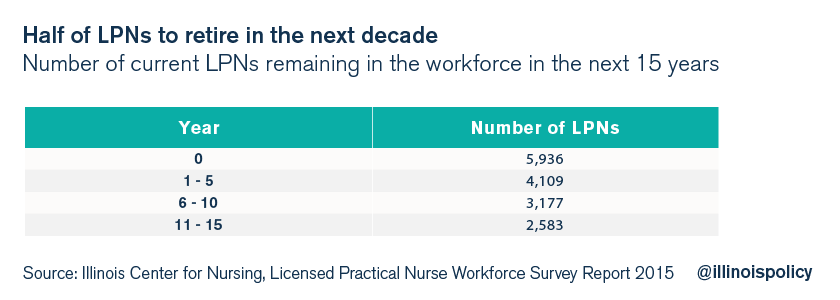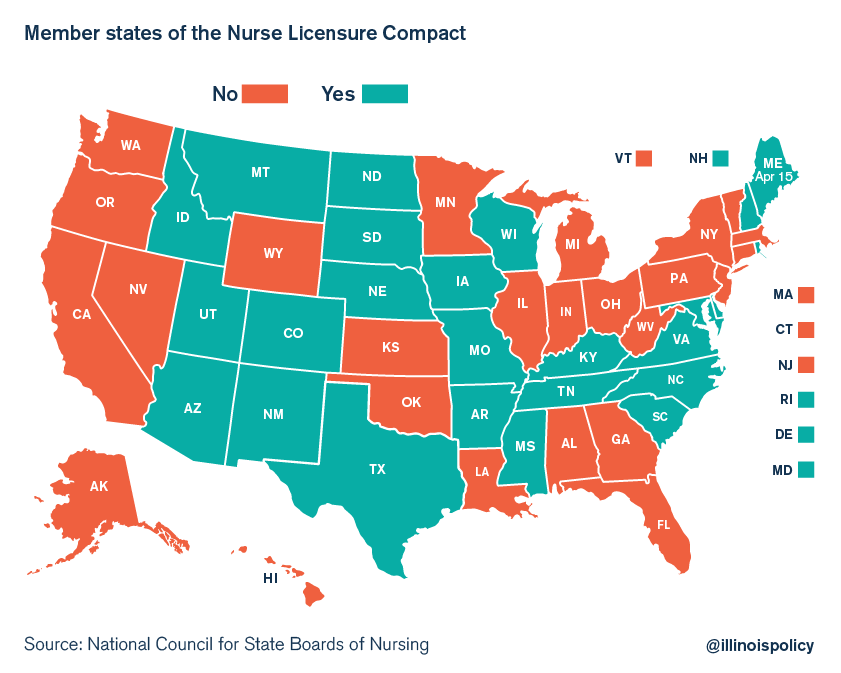Licensing laws may create a nursing shortage, leaving sick, elderly and disabled without adequate care
Illinois may soon face a nursing shortage due to a combination of demographics and regulatory barriers that prevent more nurses from practicing.
As more and more baby boomers retire, there is an increasing need for adequate care for the elderly and disabled. But a new survey indicates that Illinois may soon face a severe shortage of Licensed Practical Nurses who specialize in that care. Older nurses are retiring, and there aren’t enough younger nurses to take their place. The problem facing Illinois is not only the expected surge in retirements, but also regulatory barriers that prevent qualified nurses from becoming licensed.
The survey, published by the Illinois Department of Financial and Professional Regulation, or IDFPR, in April, found that more than a third of licensed practical nurses, or LPNs, who provide basic care to sick, elderly and disabled patients, are over 55 years old; 59 percent are over 45 years old. More than a quarter of all LPNs plan to retire in the next five years, and nearly half plan to retire in the next decade. The results mirror those of a similar survey of registered nurses, or RNs, in 2014. But while the secretary of IDFPR called the result “a clarion call,” regulation remains a major barrier to providing adequate care over the next five years and beyond.

All states regulate LPNs, but other than requiring the same federally administered exam, each state has its own set of rules. In principle, these laws protect patients from unqualified nurses, but evidence suggests more restrictive rules not only fail to improve care, but also can harm patients by making care less affordable and accessible. That’s because RNs and LPNs have successfully lobbied for increasingly restrictive rules, which often do not apply to nurses who already have their license, but make it harder for newly qualified individuals to practice their vocation.
For example, a nurse in Iowa can cross the border to practice in Missouri and vice versa, but cannot practice in Illinois without passing additional regulatory hurdles. Unlike Illinois, both Iowa and Missouri are members of the 25-state Nurse Licensure Compact, which allows nurses to have one multistate license. All of Illinois’ neighboring states, except Indiana, participate. And while Illinois does provide a route for nurses from other states to become licensed in Illinois, the process can be time consuming. These unnecessary extra hurdles not only make it harder for nurses to come to Illinois, but also reduce the incentives for nurses to become qualified in Illinois knowing that it will be harder to move to other states.

Even when a person is qualified, the license may prohibit him or her from practice because of increasingly restrictive “scope of practice” laws. A nurse practitioner might be qualified to prescribe some low-risk drugs, but the law restricts that duty to doctors. LPNs are trained to administer medication by IV, but in Illinois (though not in many other states) only RNs are permitted to do so. And while RNs can delegate to a supervised nurses’ assistant or unlicensed assistant, LPNs are far more restricted in their ability to do so. As a result, many medical professionals are unable to perform the tasks they are qualified and trained for and instead spend their time on tasks others can perform just as well.
While additional training may in some sense be desirable, requiring more training than the job demands increases costs for the patient and reduces access to services. As Illinois faces an upcoming shortage of licensed nurses, policymakers need to consider ways to ensure all residents have access to affordable care. Relaxing overly burdensome restrictions on LPNs and RNs’ ability to practice their jobs is an important part of meeting that goal.
